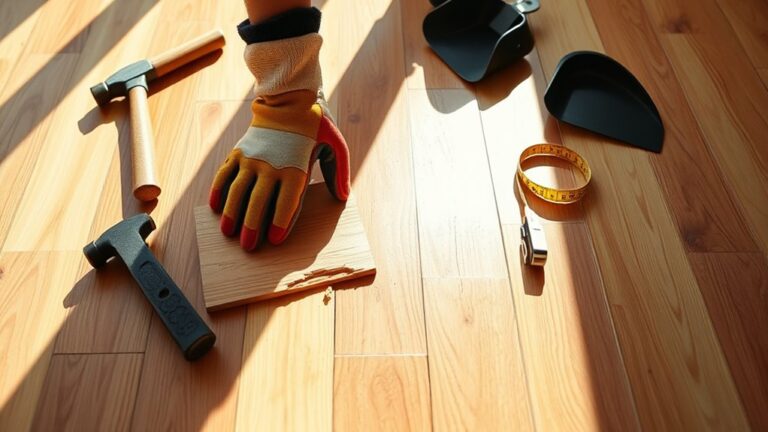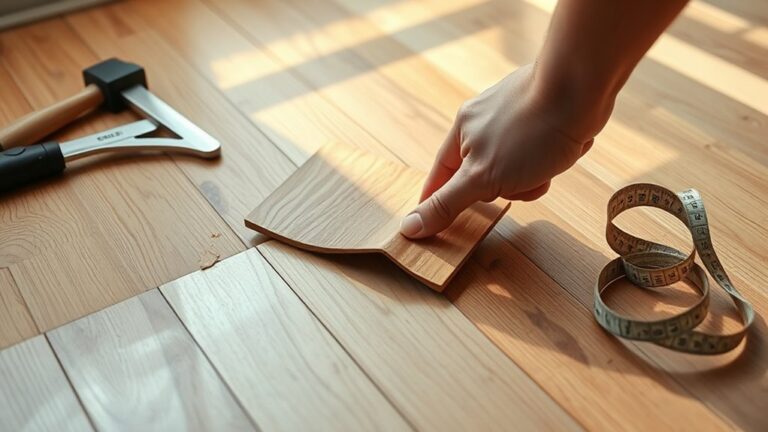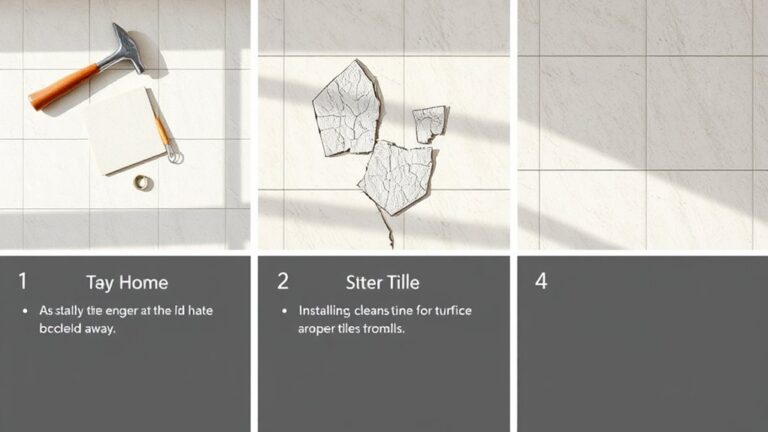To remove water stains from stone floors, start by soaking the affected area with a granite cleaner for about a minute. Use a soft nylon brush to scrub gently, avoiding scratches. For tougher stains, make a paste from baking soda and let it sit for several hours. You can also try a poultice made from a cleaning agent and absorbent material for stubborn spots. Always rinse thoroughly and dry the area to prevent future stains. Using the right products and techniques can make a big difference, and there are even more tips that can help you maintain your stone floors effectively.
Understanding Water Stains
Water stains on stone floors can be a frustrating issue, especially if you don't understand their cause. Typically, these stains arise from hard water, which contains calcium and magnesium. When water evaporates, it leaves behind mineral deposits that cling to your natural stone surface, creating unsightly white or cloudy spots. This is particularly problematic for porous stones like limestone, marble, and travertine, as these materials tend to absorb moisture more readily.
Regular exposure to moisture from spills or high humidity environments can exacerbate the formation of water stains. If you notice stains appearing often, it's important to look at your cleaning habits. The cleaning products you use can either help prevent water stains or make the problem worse. Some aggressive cleaners can damage the delicate surface of natural stone, leading to further issues.
Understanding the specific needs of your stone type is vital. Different stones have different properties; for instance, porous limestone requires gentler treatment compared to denser marble. Being proactive can help you prevent water stains before they become a persistent problem.
To maintain your stone floors, consider using pH-balanced cleaning solutions designed for natural stone. Regular sealing of the stone can also create a protective barrier against moisture absorption. By taking these steps, you'll not only enhance the appearance of your floors but also prolong their lifespan, allowing you to enjoy your beautiful stone surfaces without the worry of water stains.
Effective Removal Techniques
Knowing how to effectively remove water stains can save you a lot of frustration. If you're dealing with hard water stains on your natural stone floors, start by soaking the affected area with a granite cleaner for about a minute. This helps loosen mineral deposits without harming the stone surface. After soaking, use a soft nylon brush to scrub gently, ensuring you don't scratch the stone.
For stubborn stains that just won't budge, consider making a baking soda paste. Apply this paste to the stain and let it sit for several hours. The baking soda works to draw out impurities, making it easier to remove the discoloration. If the stain persists, you might need to use a poultice made from a cleaning agent and an absorbent material. Apply this poultice directly to the stain and let it absorb the discoloration over time.
Once you've tackled the stains, it's essential to rinse the stone with clean water and thoroughly dry the surface. This step prevents new stains from forming due to residual moisture. To keep your stone looking its best and to prevent future water stains, regular polishing with a stone-specific product, like Granite Gold Polish®, is highly recommended.
Choosing the Right Cleaners
When it comes to cleaning stone floors, choosing the right products is vital to preserving their beauty and integrity. You'll want to opt for pH-neutral cleaners specifically designed for natural stones, like Granite Gold All-Surface Cleaner®. These products are safe to use and won't etch or damage your stone surfaces. It's important to avoid using common household cleaners with high acidity or alkalinity, as they can strip away sealants and harm the finish of your floors.
Specialty cleaners, such as Granite Gold Shower Cleaner®, are particularly effective for removing water stains and mineral deposits without compromising the stone's integrity. Regular use of these specialized cleaners not only helps in removing water stains but also maintains the seal on your stone surfaces, preventing future buildup of hard water stains.
Before you engage in cleaning, always test any new product in an inconspicuous area. This precaution guarantees that it won't cause discoloration or damage to your natural stones. Remember, if you notice any stains on natural stone, the right cleaning solution can make all the difference. Your goal is to keep your floors looking pristine without risking their condition. By using the right cleaning techniques and products, you can effectively manage water stains and maintain the elegance of your stone floors for years to come.
Preventative Maintenance Strategies
Your stone floors deserve the best care to maintain their beauty and durability. To prevent water stains and guarantee the longevity of your stone surfaces, consider implementing a regular preventative maintenance routine. Start by cleaning your stone floors with pH-neutral cleaners. These products help avoid the buildup of hard water stains while preserving the integrity of the surface.
Applying a granite sealer every 6 to 12 months is vital for protecting porous stones from moisture absorption and staining. This proactive step creates a barrier, reducing the risks associated with water exposure. Additionally, make it a habit to dry stone surfaces after use, especially in high-moisture areas like bathrooms and kitchens. This simple practice minimizes the chance of water stains forming.
Using coasters and trivets under items that might spill or leave marks is also important. By doing so, you prevent direct contact with the stone, safeguarding it from potential damage.
Lastly, regularly inspect your stone surfaces for any signs of wear or staining. Early detection allows for prompt action, making it easier to address issues before they become permanent. By following these preventative maintenance strategies, you can enjoy your beautiful stone floors for years to come, free from the worry of unsightly water stains. Remember, a little effort goes a long way in preserving the natural elegance of your stone surfaces.
Professional Restoration Options
Restoring the beauty of stained or dull stone floors can be a transformative process. If you're dealing with unsightly water stains, engaging professional restoration options can be your best bet. Experts in stone restoration, like Restore-A Floor, utilize customized techniques tailored to the specific type of stone you have and the nature of the stains. This guarantees that your natural surfaces are treated appropriately.
Professional restoration services typically include deep cleaning, polishing, and sealing. These methods not only remove water stains but also enhance the overall appearance and longevity of your stone surfaces. By opting for professional help, you save time and effort compared to DIY attempts, especially for extensive staining issues that require specialized knowledge and tools.
Many companies offer free estimates for stone restoration projects, allowing you to assess potential costs without any commitment. This transparency helps you make an informed decision while guaranteeing your surrounding areas remain protected during the restoration process.
Choosing to invest in professional restoration means you're prioritizing the beauty and durability of your stone floors. With the right techniques and equipment, professionals can restore your floors to their original glory, giving you the freedom to enjoy your space without the worry of stains or dullness. If you're ready to breathe new life into your stone surfaces, consider reaching out to a restoration expert today. You won't regret it!
Frequently Asked Questions
How Do You Get Water Stains Out of Stone Floors?
When it comes to tackling water stains on stone floors, you're walking a tightrope between effective solutions and surface protection. Start with gentle cleaning techniques using pH-neutral cleaners. For stubborn stains, consider natural remedies like a baking soda poultice. Don't forget preventive measures like promptly drying spills and applying a stone sealer. Regular maintenance tips, such as weekly cleaning, can guarantee long-term care, keeping your floors looking pristine and stain-free.
How to Remove Hard Water Stains From Stoneware?
To remove hard water stains from stoneware, start with gentle cleaning techniques. Avoid acidic cleaners to prevent damage. Instead, use a DIY solution of baking soda and water. Apply it to the stain, letting it sit for a few hours. For maintenance, recommend sealing options to protect your stone. Regularly clean with soft cloths and a suitable product for stain prevention. These practical tips will help guarantee your stoneware stays beautiful.
How to Get Drink Rings Out of Stone?
Imagine your stone surfaces as a canvas, where every drink ring tells a story. To erase those tales, start with pH-neutral cleaning solutions tailored for stone care. For stubborn stains, try DIY methods like a baking soda paste. If they're still there, consider professional services or a poultice as a last resort. Regular maintenance tips like sealing can prevent future stains, ensuring your stone stays beautiful and free from unsightly marks.
Can You Get Stains Out of Natural Stone?
Yes, you can get stains out of natural stone using effective cleaning techniques. For stain prevention, consider regular maintenance tips like sealing your stone types. DIY solutions, such as a baking soda paste, can lift stains, while gentle scrubbing with non-scratch pads helps avoid damage. If stains persist, you might want to look into professional services or eco-friendly product recommendations designed specifically for stone care. Keep your surfaces looking great with these strategies!




